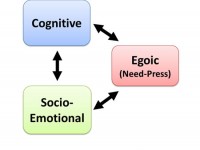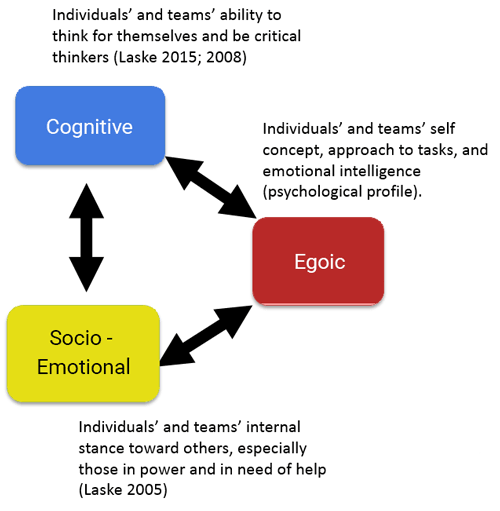In diesem Artikel fuehre ich im Einzelnen die Geschichte und die Eigenart des Constructive Developmental Framework (CDF) aus. Ich moechte zeigen wie insbesondere ein soziologischer Beratungsansatz wie New Deal (Gucher 2015), aber auch aehnliche Beratungsvorgehen, durch Einsicht in die lebenslange Entwicklung von Menschen vertieft und im Dialog mit Kunden flexibel werden koennen. Der Nachdruck im Text liegt darauf, dass alle Dimensionen von Sozialkapital -- persoenliche Beziehungen, Emotionen, Aufmerksamkeit und Wissen -- in ihrer Bestehensweise und Verwendung entschieden von dem Reifegrad von Individuen und Teams abhaengen. Dies legt nahe, die auf New Deal beruhenden Interventionen durch sozial-emotionale und kognitive Werkzeuge aus CDF zu bereichern und dadurch zu staerken. Insbesondere erhoeht man durch CDF die Dialogfaehigkeit von Gruppen und Teams und staerkt das fuer eine kollaborative Arbeitsweise notwendige gegenseitige Vertrauen. Der Artikel behandelt sowohl wie man CDF durch Gruppenarbeit am Interdevelopmental Institute erlernt und wie man das erlangte Wissen in Kundenberatung und Coaching einfuehren kann. Anfragen ueber Lehrweise und Kosten der CDF Ausbildung zur dialogischen Beratung bitte an Otto Laske, otto@interdevelopmentals.org, richten. Durchdringung des New Deal mit CDF Feb. 2018 Read More...
Tag: Thought Forms
Introduction to “Dynamic Collaboration: How to Strengthen Self-Organization and Collaborative Intelligence in Teams” (Jan De Visch & Otto Laske 2018)
This blog gives readers access to the Introduction to Jan DeVisch's and my book entitled Dynamic Collaboration: How to strengthen self organization and collaborative intelligence in teams, to be launched in May 2018 at the University of Antwerp, Belgium. In this book of five chapters, we deviate from the extant team literature by adopting an adult-developmental perspective and instead of "skills", "competences", and "agile" mantras and tool kits focus on the structure and quality of team dialog as the source of self-organization both in individuals and teams. We equate self-organization with being mature enough to be aware of the structure of one's emotions and thoughts as an expression of the level of one's adult development. To provide senior managers with new ways of thinking about teams and new kinds of interventions derived therefrom, we show that teams are always developmentally mixed -- composed of different developmental levels -- and dependent upon how team majority relates to team minority, are prone to being either up- or downwardly divided, rather than unified. We put at the disposition of senior managers a large set of tools unknown to them that derive from adult-developmental research at Harvard's Kohlberg School since 1975, showing them how... Read More...
New Dialog Methods for Broad-Spectrum Systems Constellations: Comments on the Milano Workshop on Intelligenza Collaborativa Nel Team
As shown at and, on this website, at , a workshop on new dialog methods specifically for creating collaborative intelligence in teams will take place in Milano, Italy, on January 30-31,2018. The workshop is offered by Consulenza Evolutiva, Milano and its Altroove School, and staffed by Lorenzo Campese, Alessandro Rossi, and Otto Laske. The workshop is a pioneering first in that it introduces Broad-Spectrum Systems Constellations which broaden the focus of attention of conventional constellations as detailed in the attached pdf. The workshop is held both in Italian and English. Those interested in signing up for the workshop with Consulenza Evolutiva will find further details on the workshop process below. Broad-Spectrum Systems Constellations Read More...
Thought Form Constellations as Measures of Team Connectivity
In this article, the author proposes structural, rather than behavioral or emotional, measures of team connectivity and introduces the notion of "cognitive" or "structural" systems constellations. These measures are derived from DTF, his Dialectical Thought Framework, a methodology rooted in cognitive developmental research since 1975. In contrast to the contemporary team literature, and in a follow up of an article co-authored with Graham Boyd on Distributed Leadership found in a book forthcoming at Palmgrave Publishers, UK, (#aboutBook), the author focuses on measuring team connectivity based on a team's cognitive behavior graph in real time. The author teaches DTF to both individuals, especially as coaches, and teams, in hands-on workshops in English and German, and with the help of a translator also in Spanish and Italian. TF Constellations 2 Read More...
Improving Management by Design: Novel Tools for Expanding and Deepening the Business Model Design Space
I propose to strengthen the cognitive processes involved in design thinking, especially for cross-functional teams, both through artificial intelligence techniques and focused cognitive coaching. I take as an example of design thinking the canvas metaphor used by Osterwalder and Pigneur (2014, 2010), selecting its CS (customer segment) component for further scrutiny. Specifically, I introduce an amplified form of design thinking called "transformational" thinking that is grounded in research in adult cognitive development over the lifespan (Laske 2008 [2017b/c]). My approach is rooted in DTF, the Dialectical Thought Form Framework developed at the Interdevelopmental Institute (IDM) since the year 2000. In focus in the blog is the notion of “hidden dimensions” of the canvas that iterative cognitive sprints of a cross-functional team reveal. I see such sprints as based on a combination of “breadth-first” and “depth-first” search, where the former is focused on creating the biggest possible picture, while the second deepens and refines the picture in its details, both in terms of thinking and resulting outcome. I show that the two kinds of searches are mutually reinforcing and that purely logical thinking (and thus algorithmic thinking also) fail in depth-first search, At the end of the text, I demonstrate by... Read More...
A Problem-Driven Mentoring and Teaching Program for Learning Complexity Thinking
This blog introduces the new IDM Program for learning complexity thinking based on critical problems brought forward by the client. Client-proposed problems serve as a procedural and behavioral guideline for a 5-step acquisition of cutting-edge solution approaches that have been tested in previous IDM teaching and are grounded in Roy Bhaskar’s work on dialectic (1993). In contrast to earlier IDM offerings, the present one progresses in clear steps from module to module to facilitate learner progress. Emphasis in the course is put on “doing” over passive listening. Lecturing is kept to a minimum. A progressive sequence of mandatory "meta-thinking" exercises is in place. The program comprises 5 steps taking 9 months to 1 year to complete, depending on the learner’s present level of cognitive development and mental habits. It concludes with three successively higher-level certifications in complexity thinking for use in life and work. Course materials are module-specific and are enriched by IDM publications on sale at www.interdevelopmentals.org under Publications, or taken from recent blogs by Otto Laske. A discount applies to registering for 4 of the 5 modules upfront, after writing to otto@interdevelopmentals.org to discuss the learner's agenda. In coming months, the program will move from its present test-phase... Read More...



